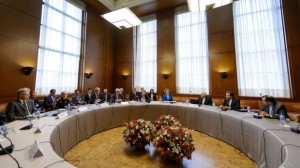 A senior Iranian lawmaker says the disclosure of the contents of the nuclear negotiations between Tehran and six major world powers would allow Iran's enemies to torpedo the process of the talks.
A senior Iranian lawmaker says the disclosure of the contents of the nuclear negotiations between Tehran and six major world powers would allow Iran's enemies to torpedo the process of the talks.
“Certain details of the negotiations cannot be revealed as it will disrupt the trend of the talks,” said Hossein Sobhani-Nia, who sits on the Presiding Board of Iran’s Majlis.
“There is no need to disclose the details of the talks while the nuclear team is negotiating, and the talks should be allowed to move forward,” the Iranian legislator stated.
The MP, however, said the Iranian people should be informed about the details of the discussions in due time.
Iran and the five permanent members of the UN Security Council - Russia, China, France, Britain and the US - plus Germany held two days of negotiations over Tehran’s nuclear energy program behind closed doors in Geneva, Switzerland, on October 15-16. The two sides agreed to meet again in Geneva on November 7-8.
During a meeting on October 15, Iranian Foreign Minister Mohammad Javad Zarif presented Iran’s proposal titled “Closing an Unnecessary Crisis, Opening a New Horizon” to EU Foreign Policy Chief Catherine Ashton, and the representatives of the six countries. The two sides agreed to keep the details of the proposal confidential for the time being.
Sobhani-Nia expressed optimism about the outcome of the talks “because our country’s nuclear negotiating team is efficient and closely integrated, and is doing its work well.”
The parliamentarian further called on the Iranian nuclear team to be vigilant about the moves of the opposite side’s negotiators because they, too, are “professionals.”
On October 18, the Iranian foreign minister warned that Israel is trying to sabotage the ongoing negotiations between Iran and the six major world powers, saying both sides have agreed to keep the contents of the talks confidential in an attempt to avert the potential negative effects of propaganda.
“The Zionists have the most fear about the success of the talks and, considering their active presence in the Western media, there is a strong possibility that they may make different - and sometimes outrageous - efforts to disrupt the negotiations,” Zarif said.
Following the Geneva negotiations, Ashton lauded the talks as the most “detailed” and “substantive” ever between the two sides, describing Iran’s new proposal as an “important contribution.”
By Press TV
The Iran Project is not responsible for the content of quoted articles.

 QR code
QR code